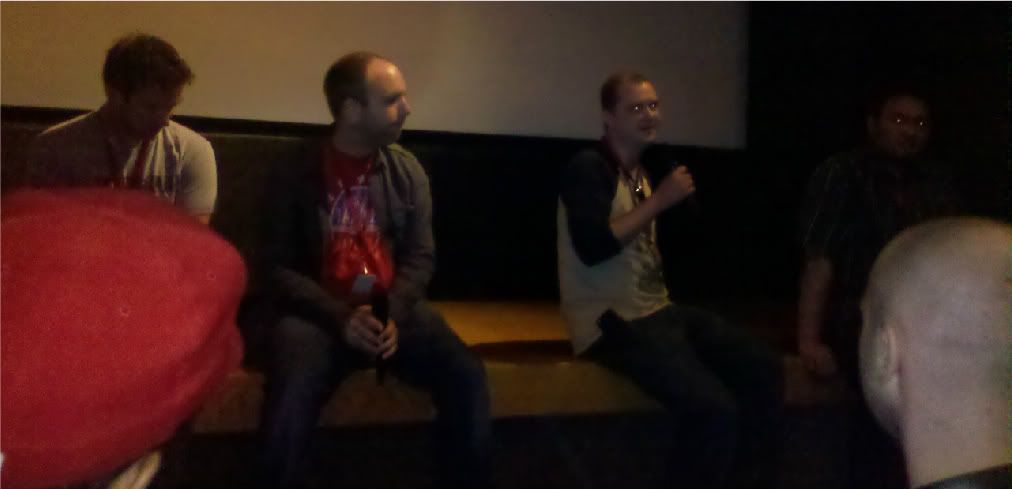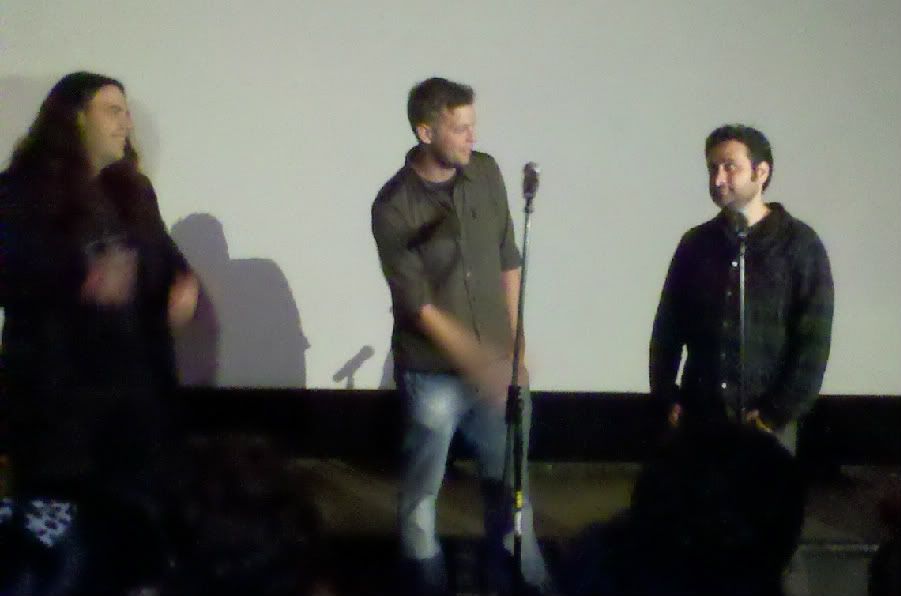The night ended with a dud - as you might expect, Horny House of Horror is Not Very Good. It was exacerbated by a couple people a row or two behind me who just wouldn't shut up. Now, again, it's not very good, so it's hard to use "show some respect" as a retort - and lord knows that this is the sort of turkey that might be made tolerable by some audience participation - but these folks were not that clever. When one said she was glad she smoked a joint before coming to see this movie, that pretty much explained it.
And now, before getting to reviews, the requisite terrible photography:

Absentia folks: Co-stars Justin Gordon (?) and Morgan Peter Brown (?), writer/director Mike Flanagan, and producer Jason Poh.
Another good bunch of people who spent some time talking about the mythology they constructed for their movie and the challenges of making something this independent. Like many movies this size, the film was written to the locations and cast, to the point where they decided to include co-star Courtney Bell's real-life pregnancy (not that this was a surprise that caused frantic re-writes; she and Flanagan are married). It absolutely works in the movie, but it also forced them into a very specific shooting schedule.

Mitch Davis leads Rabies directors Aharon Keshales and Navot Papushado in an animated Q&A.
An very good Q&A, with some information worthwhile enough to make it into the review (I sometimes think that doing that is bad form, since the movie should be judged on its own merits). That the cast was apparently made up of people who are fairly popular in Israel was surprising to me; on the surface, this seems like the sort of thing that would be made with the filmmakers' friends who were willing to work for nothing - one director just out of film school, the other his teacher, a genre that has never been much supported in the country. You can add Israel to the list of countries whose young genre filmmakers grumble about the lack of public arts funding for movies that are not wrenching dramas, apparently (I've heard the almost exact same complaint, almost word-for-word, from South African and Costa Rican directors; only the examples of what was acceptable material changed).
(Potential spoilers in this paragraph) The talk about how the story was meant to represent Israel was interesting, too. The thrust seemed to be that left to themselves (or given the slightest push), the country will tear itself apart without any outside help. Thus, even though the typical slasher-movie villain gets knocked out of the movie early, things continue to go wrong. The crude real-world parallel, I guess, is that even if you take away the dangers in that country which regularly make the news, there's a lot of internal conflict there (which I can imagine - serious generational and class differences and immigration not driven by economics can make a mess out of a country).
Or everybody thinks their own country is a special mess. There's likely a bit of that going on, too.
Absentia
* * * (out of four)
Seen 29 July 2011 in Salle de Seve (Fantasia 2011)
It's almost a shame that Absentia goes the direction it does, because there is a fantastic mystery or film noir to be built on the same characters and set-up. Of course, what writer/director Mike Flanagan comes up with is quite good as well - impressive enough given its very limited resources to qualify as a hidden gem.
When somebody goes missing without a trace, it generally takes seven years before they can be declared dead in absentia, and that landmark is coming up in the case of a California man. Though his wife Tricia (Courtney Bell) still regularly makes sure fresh posters are visible around the neighborhood, she is ready for some form of official closure - and her very visible pregnancy suggests that she's at least starting to move on. Arriving to provide support is youngr sister Callie (Katie Parker), who has spent a lot of time off the map herself over the last five years, but has now found God and gotten on the straight and narrow. What should be an emotional but cathartic process takes some strange turns - for instance, Tricia's vivid hallucinations of her husband (Morgan Peter Brown), and a weird encounter Callie has with a homeless man under a nearby bridge. When things become a little more tangible, the detective who has been working the case for the past two years (Dave Levine) comes in to investigate.
Mentioning that weird things may be going on is almost giving too much away, although even with only conventional elements in play, Flanagan is able to create a situation that offers plenty of opportunities for twists and turns. The film may not necessarily become even an unconventional whodunit, but very little of this set-up is wasted - every comment that could portend a plot twist also serves to increase tension as the characters are being put under more pressure toward the end of the film. It goes to show what a nice set of human, believably flawed characters Flanagan and the cast have created: There are very few moments where the characters do something unreasonable, given what we learn about them.
Full review at EFC.
Beyond the Black Rainbow
* * ¾ (out of four)
Seen 29 July 2011 in Salle de Seve (Fantasia 2011)
Depending on what sort of film fan you are, you may find yourself vaguely giddy - or confused - as this movie opens. After all, while it's not uncommon to see the grindhouse and horror movies of the 1970s and 1980s revisited with lots of admiration and affection, the distinctive science fiction of that era gets very little love. Beyond the Black Rainbow is a dead-on recreation of that sort of film, and while it's very cool to revisit that aesthetic, there's a reason you don't see many like this nowadays.
In a sterile underground base, there lives a silent girl named Elena (Eva Allan). She encounters very few other human beings - mainly Margo (Rondel Reynoldson), her caretaker, and Barry Nyle (Michael Rogers), a scientist who occasionally summons her to a room for experiments meant to measure her emotional response. This has been going on for some time, but things are about to get even stranger, as the visionary behind this project, Mercurio Arboria (Scott Hylands), is dying, and Nyle is growing more detached from his wife Rosemary (Marilyn Norry) and humanity in general.
Beyond the Black Rainbow is very much an attempt to recreate a specific time; look at what dates, fashions, and equipment show up on-screen, and the movie is set firmly in the early to mid-1980s. That's about when movies like this finished dying out, as Star Wars became the model for big-budget sci-fi rather than the austere descendants of Stanley Kubrick's 2001 and George Lucas's THX-1138. Writer/director Panos Cosmatos and production designer Bob Bottieri capture the look of this sort of movie perfectly, with walls that glow purple, large monochrome rooms, and a great deal of communication done through dehumanizing video screens. The soundtrack is dead-on as well, all synthesizers that seem less like music than an ominous mechanical pulse.
Full review at EFC.
Kalevet (Rabies)
* * * ½ (out of four)
Seen 29 July 2011 in Theatre Hall (Fantasia 2011)
The title of Rabies, billed as Israel's first horror movie, may be a bit deceptive; the movie is not a take on the zombie-virus genre at all (in Hebrew, the word is apparently closer to the original Latin root's meaning of "rage"). In another perhaps-unexpected turn, filmmakers Aharon Keshales and Navot Papushado have opted to skip over simply handling the basics of the genre and go straight for subversion. The movie still has plenty of blood, guts, and suspense, but it's in the service of black, satiric comedy more than formula.
It starts out looking conventional before the credits - Tali (Liat Harley) and Ofer (Henry David) have run away from home, and Tali has fallen into a trap of some sort in the woods, only able to hear screaming when her brother runs for help. Then the rest of the potential body count shows up: Rona (Erfat Boimold) and her boyfriend Menashe (Menashe Noy) are forest rangers, patrolling a national park with Menache's dog Buba. Mikey (Ran Danker) has gotten lost driving his obnoxious friend Pini (Ofer Shechter), Pini's crush Shir (Yael Grobglas), and Shir's friend Adi (Ania Bukstein) to a tennis match. Police officers Yuval (Danny Geva) and Danny (Lior Ashkenazi) are also in the area, and will naturally be called in, although Yuval's bad attitude and Danny's reluctance to stand up to it are not going to be a great help.
The tone of a horror-comedy like Rabies can be incredibly difficult to get right; it's extremely easy for the jokes to seem out of place or for the danger to be undercut. Keshales and Papushado avoid this pitfall by having the comedy get darker as it goes along. What starts as somewhat tired material gets edgier and more surprising as the film continues. Sometimes the comedy is the result of broad absurdity (of course running from one thing leads characters into a minefield); other times the movie takes on the form of a slapstick farce, except that blows to the head lead to horrible death rather than comic unconsciousness. And then, moments that could be funny in a way that engages the audience's mean streak become tragic.
Full review at EFC.
Fasshon Heru (Horny House of Horror)
* ¼ (out of four)
Seen 29 July 2011 in Theatre Hall (Fantasia 2011)
Horny House of Horror is disappointing. Now, many reading this will think "well, duh, film-critic-guy, if you go in expecting every movie to be Citizen Kane, even ones titled 'Horny House of Horror', you'll always be disappointed!" But ponder for a moment - what if my expectations were properly calibrated for low-budget smut? What does "disappointing" mean then?
It means a steaming pile, is what it means. This one involves Nakatsu (Yuya Ishikawa) and his friends Uno (Toshi Yanagi) and Doshida (Wani Kansai) going to a cheap "fashion health" massage parlor after their last amateur-league baseball game together to give the engaged Nakatsu a proper send-off. However, it turns out that the girls at this place are more than just prostitutes - Kaori (Mint Suzuki), Nonoko (Asami), and new hire Nagisa (Saori Hara) are killers, too!
Now, bear with me for a moment, because I'm about to apply much more thought to this situation than writer/director/editor Jun Tsugita did, but... What is this place's business model? Killing the clientele on their first visit certainly doesn't get you repeat business, and the low, low prices mean that you probably aren't going to attract people with a lot of money to steal. Sure, the rent on the pit where they work is probably low, and without word-of-mouth, daily business must fluctuate wildly. Does that support three girls and a bouncer (Akira Murota)? Especially when it's revealed that this place is only one of many?
Full review at EFC.
No comments:
Post a Comment